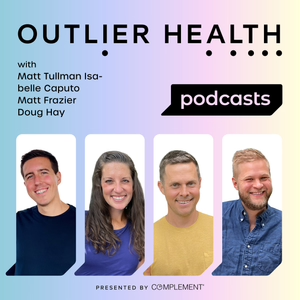
The Next Frontier: Medtronic's CTO Ken Washington discusses AI, Robotics and Patient Outcomes
02/01/25 • 31 min
Medtronic's technological strategy represents a sophisticated convergence of AI, data analytics, and medical innovation, positioned to fundamentally reshape healthcare delivery. Under Chief Technology Officer Ken Washington's leadership, the organization is pioneering a model of technological augmentation that prioritizes human expertise while leveraging advanced computational capabilities. The core strategic approach focuses on developing intelligent medical devices that provide precision insights and predictive healthcare interventions.
The technology framework centers on comprehensive data infrastructure, spanning 70 distinct medical conditions. By meticulously collecting and analyzing patient data through advanced sensing technologies, Medtronic is developing AI-enabled platforms capable of personalized health monitoring and preemptive diagnostic capabilities. This approach transforms medical technology from a reactive to a predictive model, potentially reducing healthcare costs and improving patient outcomes through early intervention strategies.
Washington's innovation model extends beyond technological development to include critical considerations of regulatory compliance, global scalability, and sustainable design. With a commitment to net-zero emissions by 2045 and strategic partnerships across healthcare and technology sectors, Medtronic is positioning itself as a leader in responsible, forward-thinking medical innovation. The organization's approach integrates high-precision robotics, advanced algorithmic models, and data-driven personalization to create transformative healthcare solutions that address complex global health challenges.
About
Ken Washington serves as Senior Vice President and Chief Technology and Innovation Officer. In this role, Ken is responsible for accelerating Medtronic innovation through product development and technology strategies.
Ken joined Medtronic in 2023 and brought with him deep expertise in leading technology development and execution across industries including robotics, consumer products, automotive, and space. Ken inspires teams and pushes them even further in their ability to invent, innovate and create positive market disruptions. He partners closely with teams and leaders around Medtronic to ensure our products and therapies continue to advance the Mission to better serve patients and customers.
Prior to joining Medtronic, Ken was Vice President and General Manager of Consumer Robotics at Amazon. Prior to that, he was Chief Technology Officer at Ford Motor Company, overseeing development of the company’s technology strategy including next-generation vehicle architectures, controls and automated systems. He also spent seven years at Lockheed Martin in various leadership roles including Chief Technology Officer, Chief Privacy Officer and Vice President, Advanced Technology Center, Lockheed Martin Space Systems Company.
Ken is an internationally recognized thought leader on technology and innovation. He earned a Bachelor of Science, a Master of Science, and a PhD in nuclear engineering from Texas A&M University. He was inducted into the National Academy of Engineering in 2020 and was inducted into the Black Engineer Hall of Fame in 2023.
Medtronic's technological strategy represents a sophisticated convergence of AI, data analytics, and medical innovation, positioned to fundamentally reshape healthcare delivery. Under Chief Technology Officer Ken Washington's leadership, the organization is pioneering a model of technological augmentation that prioritizes human expertise while leveraging advanced computational capabilities. The core strategic approach focuses on developing intelligent medical devices that provide precision insights and predictive healthcare interventions.
The technology framework centers on comprehensive data infrastructure, spanning 70 distinct medical conditions. By meticulously collecting and analyzing patient data through advanced sensing technologies, Medtronic is developing AI-enabled platforms capable of personalized health monitoring and preemptive diagnostic capabilities. This approach transforms medical technology from a reactive to a predictive model, potentially reducing healthcare costs and improving patient outcomes through early intervention strategies.
Washington's innovation model extends beyond technological development to include critical considerations of regulatory compliance, global scalability, and sustainable design. With a commitment to net-zero emissions by 2045 and strategic partnerships across healthcare and technology sectors, Medtronic is positioning itself as a leader in responsible, forward-thinking medical innovation. The organization's approach integrates high-precision robotics, advanced algorithmic models, and data-driven personalization to create transformative healthcare solutions that address complex global health challenges.
About
Ken Washington serves as Senior Vice President and Chief Technology and Innovation Officer. In this role, Ken is responsible for accelerating Medtronic innovation through product development and technology strategies.
Ken joined Medtronic in 2023 and brought with him deep expertise in leading technology development and execution across industries including robotics, consumer products, automotive, and space. Ken inspires teams and pushes them even further in their ability to invent, innovate and create positive market disruptions. He partners closely with teams and leaders around Medtronic to ensure our products and therapies continue to advance the Mission to better serve patients and customers.
Prior to joining Medtronic, Ken was Vice President and General Manager of Consumer Robotics at Amazon. Prior to that, he was Chief Technology Officer at Ford Motor Company, overseeing development of the company’s technology strategy including next-generation vehicle architectures, controls and automated systems. He also spent seven years at Lockheed Martin in various leadership roles including Chief Technology Officer, Chief Privacy Officer and Vice President, Advanced Technology Center, Lockheed Martin Space Systems Company.
Ken is an internationally recognized thought leader on technology and innovation. He earned a Bachelor of Science, a Master of Science, and a PhD in nuclear engineering from Texas A&M University. He was inducted into the National Academy of Engineering in 2020 and was inducted into the Black Engineer Hall of Fame in 2023.
Previous Episode

Rare Disease Advocacy: Tamar Thompson, Global Corporate Affairs @Alexion Pharmaceuticals by AstraZeneca
- 95% of rare diseases do not have approved treatments, highlighting the significant unmet need in the rare disease community.
- The unpredictable symptoms and long diagnostic process for conditions like neuromyelitis optica spectrum disorder (NMOSD) can lead to debilitating long-term disabilities.
- There is an urgent need for increased education, resources, and support to address the global diagnostic challenge and financial burden on rare disease patients and their families.
Tamar shares her inspiring healthcare journey, starting as a provider and then transitioning to the life sciences industry after marrying an Air Force member and moving to North Dakota. She now advocates for the rare disease community, particularly focusing on NMOSD, a rare autoimmune disorder that affects the central nervous system. Tamar explains that while there are an estimated 7,000-10,000 rare diseases, only 5% have approved treatments, and 90% of these diseases do not have any approved treatments
The symptoms of NMOSD can be unpredictable and lead to long-term disabilities like vision loss and paralysis. Tamar emphasizes that the journey to diagnosis for rare disease patients can be long, often taking 7 years on average, and that NMOSD is more common in women in their mid-30s, though it can also affect men and children. Tamar discusses the challenges in diagnosing rare diseases like neuromyelitis optica spectrum disorder (NMOSD)
Rare diseases are often genetic in nature, making diagnosis difficult as symptoms can be ambiguous. Tamar highlights Alexion's history of pioneering research and development in the rare disease space, including complement-based therapies and the promise of cell and gene therapies. She emphasizes the global nature of the diagnostic challenge, with patients often seeing multiple specialists before receiving the correct diagnosis
Tamar highlights the significant financial burden on families dealing with rare diseases, with costs 10-20 times higher annually. She also touches on the promise of advancing technologies, like genome sequencing, to help with earlier diagnosis, but emphasize that access and affordability remain challenges. Overall, the discussion sheds light on the struggles faced by those impacted by rare diseases and the need for more education, resources, and support for patients and their caregivers
The discussion highlights the significant challenges faced by rare disease patients and their families, including the high financial burden and lack of awareness and support. There is a need for increased education, policy changes, and investment to foster rare disease diagnosis, treatment, and access to care.
We share the call for urgent action to address these issues and prepare for the future, given the aging population and the potential for a "silent epidemic" if left unaddressed. We discuss the challenges of diagnosing rare diseases, emphasizing the need for greater education and awareness among medical professionals.
Next Episode

Between Visits: Reimagining Continuous Healthcare, Wei-Li Shao President @Omada Health
In a groundbreaking conversation, Wei Li, President of Omada Health, outlined a transformative vision for healthcare deeply rooted in a profound belief that health is a fundamental human right. Drawing inspiration from a World Health Organization quote that "help is the core of sustainable development," Li has dedicated his entire professional career to addressing the universal health challenges people face globally. His approach seamlessly integrates technology and human connection, focusing on comprehensive, personalized care across chronic conditions like diabetes, hypertension, and musculoskeletal issues. Li emphasizes that the real healthcare challenge lies not in medical appointments, but in the day-to-day struggles people face in implementing health changes, believing that health is the foundational element for achieving life's personal and professional objectives.
Central to Omada Health's strategy is a delicate balance between AI-driven solutions and human coaching, with Li asserting that human relationships remain the critical "currency" of behavior change. The company leverages billions of health data points to create highly personalized care experiences, particularly in innovative areas like GLP-1 medication management and behavioral intervention programs. By prioritizing accessibility, continuous support, and a holistic view of patient needs, Omada Health is fundamentally reimagining healthcare delivery—making it more integrated, proactive, and centered on individual patient experiences across diverse populations. Li envisions a future where healthcare becomes as accessible and routine as daily personal care, breaking down traditional barriers between in-person and virtual health services, and providing persistent, personalized support that recognizes the complex interplay of health challenges faced by patients.
About
Wei Li is a global executive and leader with over 20 years of experience building and leading biopharmaceutical, diagnostic imaging, and digital health businesses across the world. After a rewarding 18-year career at Eli Lilly and Company, he came to Omada Health in 2019 to take on a new professional challenge––upending the status quo in chronic condition care by scaling virtual health. Currently, 70% of U.S. healthcare spending is for people with chronic conditions. He is steadfast in his belief that Omada is at the forefront of health tech innovation that's gradually improving outcomes and reducing costs for health systems and organizations.
He holds dual Bachelor of Science degrees in biochemistry and molecular biology from the University of Wisconsin-Madison and a Master of Business Administration from the Kelley School of Business, Indiana University. Over the course of his career, he has demonstrated an ability to grow successful organizations, lead turn-arounds, and establish start-ups. He has brought his wealth of experience to Omada, where he has surrounded himself with amazing people, built a strong team, set high expectations, and helped create an organization grounded in values and principles.
In addition to his professional achievements, Li has published a children's book, "Anny The Tall Girl," a touching story imbued with diversity, equity, and inclusion. He and his wife Sarah are the proud parents of two daughters.
If you like this episode you’ll love
Episode Comments
Generate a badge
Get a badge for your website that links back to this episode
<a href="https://goodpods.com/podcasts/hlth-forward-podcast-679228/the-next-frontier-medtronics-cto-ken-washington-discusses-ai-robotics-89326082"> <img src="https://storage.googleapis.com/goodpods-images-bucket/badges/generic-badge-1.svg" alt="listen to the next frontier: medtronic's cto ken washington discusses ai, robotics and patient outcomes on goodpods" style="width: 225px" /> </a>
Copy




